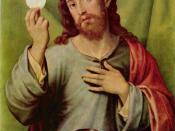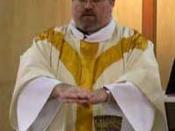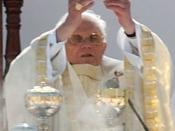3000 years ago, the Egyptians enslaved the Israelites. Moses, a simple Jewish shepherd, was instructed by God to free the Israelites. In the book of Exodus, it is read how God asked them to sacrifice a lamb and sprinkle its blood on their doorposts. Those who did this would be passed by the angel of death and spared, hence the 'Passover'. As they began their exodus out of Egypt, they ate unleavened bread, made necessary because of their hurry to leave. The Jewish Passover meal commemorated the liberation of the Israelites and the great act by God for his people. At the same time the meal expressed an eager hope and longing for the coming of the Kingdom of God.
The Synoptic Gospels describe the Last Supper as a Passover meal with Jesus and his disciples. During the meal, Jesus broke the bread (unleavened bread, as in the first Passover), said traditional prayers, distributed the bread to the disciples and added the words "This is my body.
Eat it and it shall be given up for you". And then he passed the cup of wine and said, "This is my blood, which will be poured for you. Do this in memory of me". Jesus is then recognised as the new Passover lamb, as his blood on the wood of the cross saved them from death, just as the first Passover lambs' did. In 'reconstructing' the action of the first Passover, the Last Supper is known as the New Passover.
The earliest writings that refer to the Eucharist are those of Paul's letters to the Corinthians. In his first letter to the Corinthians, Paul describes the Eucharist as a celebration central to the life and identity of Christian communities and that it must be in connection with common supper. He also,



OK...
Reads a bit disjointed and not as a complete whole. It ends rather perfunctory and would be better served with a proper conclusion.
0 out of 3 people found this comment useful.